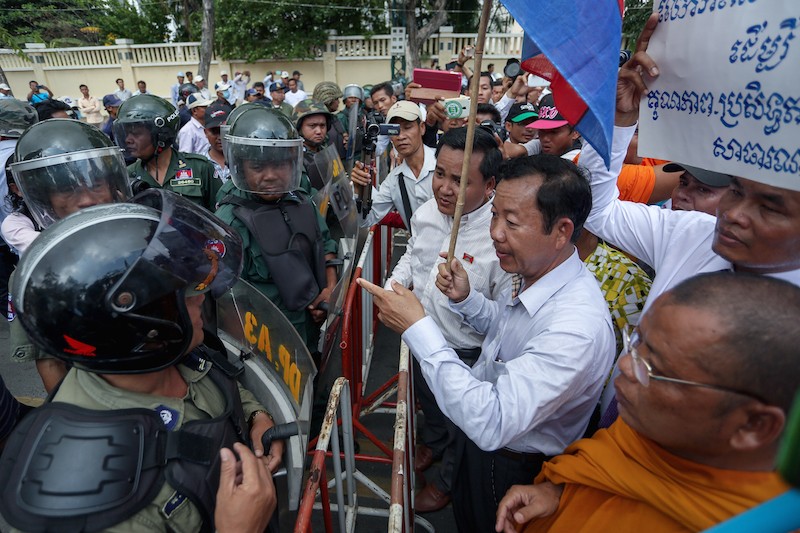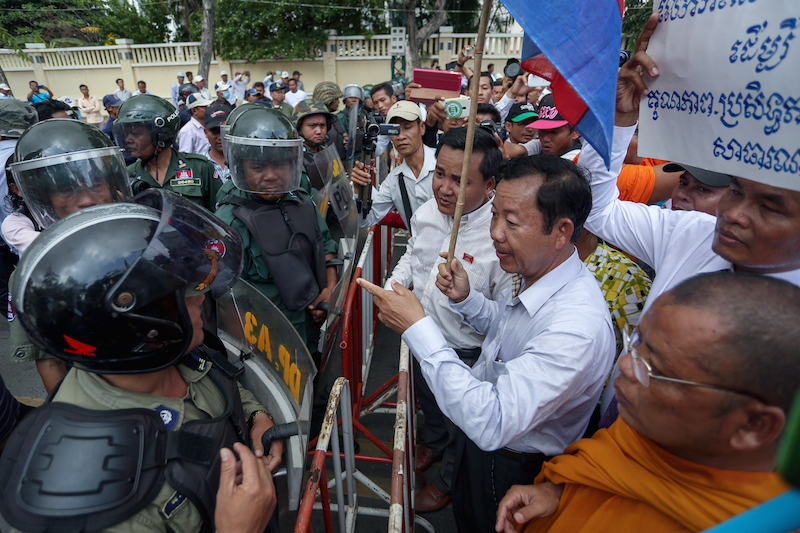Any appointments to the National Election Committee (NEC) to replace CNRP-appointed Rong Chhun, who now faces a criminal trial for “intentional violence,” would have to be approved by the ruling CPP under current laws, a lawmaker said on Thursday.
Mr. Chhun was one of the CNRP’s four appointees to the NEC under a deal with the CPP that ended the opposition’s almost yearlong boycott of parliament after the disputed 2013 national election in exchange for comprehensive electoral reform, including a new incarnation of the NEC.

Under the deal, each party selected four of the NEC’s nine board members last year, with the ninth member being approved by both. However, Mr. Chhun, a former union leader, was notified on Wednesday that he would be put on trial for the violence charges laid in 2014. The NEC law stipulates that board members automatically lose their positions if they are sentenced to a prison term.
CNRP chief whip Son Chhay said on Thursday that while the opposition had the right to select a replacement if Mr. Chhun had to leave the NEC due to a guilty verdict, the ruling party would have veto power over the choice.
“If Rong Chhun got into trouble, the CPP cannot appoint their people in this position, it would be the choice of the CNRP,” Mr. Chhay said.“But as you know, the members of the NEC also have to be approved by the National Assembly—by 50 percent plus one. That is the number we would have to get, and that would be a different question.”
“The question would be: Would the CPP approve the candidate we chose?” Mr. Chhay said.
Article 11 of the NEC law says that if any of the nine members of the NEC lose their membership for any reason, the National Assembly’s standing committee will be allowed to open the position to new applicants.
The party that loses its member will then select a candidate from the pool. Finally, the standing committee will send the new nine-member roster of the NEC to be officially approved “through an absolute-majority vote of all members of the National Assembly.”
The CPP has had a majority of 68 in the 123-seat Assembly since the 2013 election, which the opposition claimed was rigged by the old, CPP-dominated NEC.
CPP spokesman Sok Eysan acknowledged the CNRP would have the right to choose Mr. Chhun’s replacement if he were removed, but would not comment on whether the CPP would block nominees it did not like, saying only: “It will be correctly implemented in accordance with the law.”
Mr. Chhun, who led the Cambodian Confederation of Unions until his appointment to the new NEC when it was created in April 2015, denies having been present during clashes between striking workers and military police in 2014 over which he was charged.
However, he faces up to 14 years in jail if found guilty, as well as removal from the NEC just as it ramps up its efforts to re-register every voter ahead of commune elections next year and the 2018 national election.
Mr. Chhay of the CNRP said on Thursday he was concerned about the pursuit of Mr. Chhun given the CPP’s apparent intention to dominate the NEC, adding that if the CPP exercised its veto, the 2017 commune elections and 2018 election could look much like past elections.“If we don’t have the four, it’d be out of balance, and the CPP could overrule us, and the whole thing would go back to the former NEC. The majority ruled by the CPP would make all the decisions,” he said.




